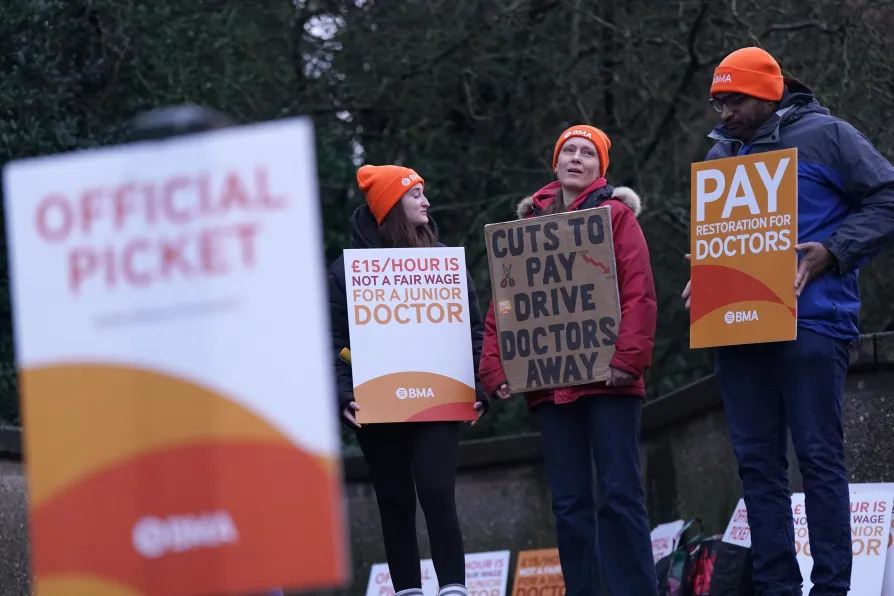
 Junior doctors and members of the British Medical Association (BMA) outside Queen's Medical Centre, Nottingham, January 3, 2024
Junior doctors and members of the British Medical Association (BMA) outside Queen's Medical Centre, Nottingham, January 3, 2024
THE NHS could face six months of disruption after resident doctors in England voted in favour of strike action today.
Downing Street said that pay negotiations would not be reopened because the government “can’t be more generous” than it has been already this year.
Some 90 per cent of voting resident doctors in England, formerly known as junior doctors, said they would down stethoscopes and take to picket lines amid an ongoing row over pay.
The British Medical Association (BMA) said that there had been a turnout of 55 per cent and that resident doctors needed an increase of 29.2 per cent to reverse “pay erosion” since 2008-09.
The union added that there was “still time to avert strike action” and urged the government to “come forward as soon as possible with a credible path to pay restoration.”
BMA resident doctors committee co-chairs Dr Melissa Ryan and Dr Ross Nieuwoudt said in a joint statement: “Doctors have spoken and spoken clearly: they won’t accept that they are worth a fifth less than they were in 2008.
“Our pay may have declined, but our will to fight remains strong. All we need is a credible pay offer and nobody need strike.
“Doctors don’t take industrial action lightly, but they know it is preferable to watching their profession wither away.
“The next move is the government’s. Will it repeat the mistakes of its predecessor? Or will it do the right thing and negotiate a path to full pay restoration and the restoration of doctors’ confidence in our profession’s future?”
The ballot gives resident doctors a mandate for strike action until January 2026.
A fresh bout of walkouts could cause severe upheaval across the health service.
Resident doctor members of the BMA have taken industrial action 11 times since 2022.
Previous strikes by resident doctors and other staff groups led to some 1.5 million appointments, procedures and operations being postponed.
Danny Mortimer, chief executive of NHS Employers, which is part of the NHS Confederation, called the strikes vote ”a troubling development.”
He said: “Further strikes are the last thing health leaders wanted and could result in tens, if not hundreds of thousands, of operations and procedures being delayed or cancelled, leaving patients in pain or discomfort.”
Health Secretary Wes Streeting has invited BMA representatives to discuss issues related to working conditions and claims to be committed to “working together” to find solutions.














